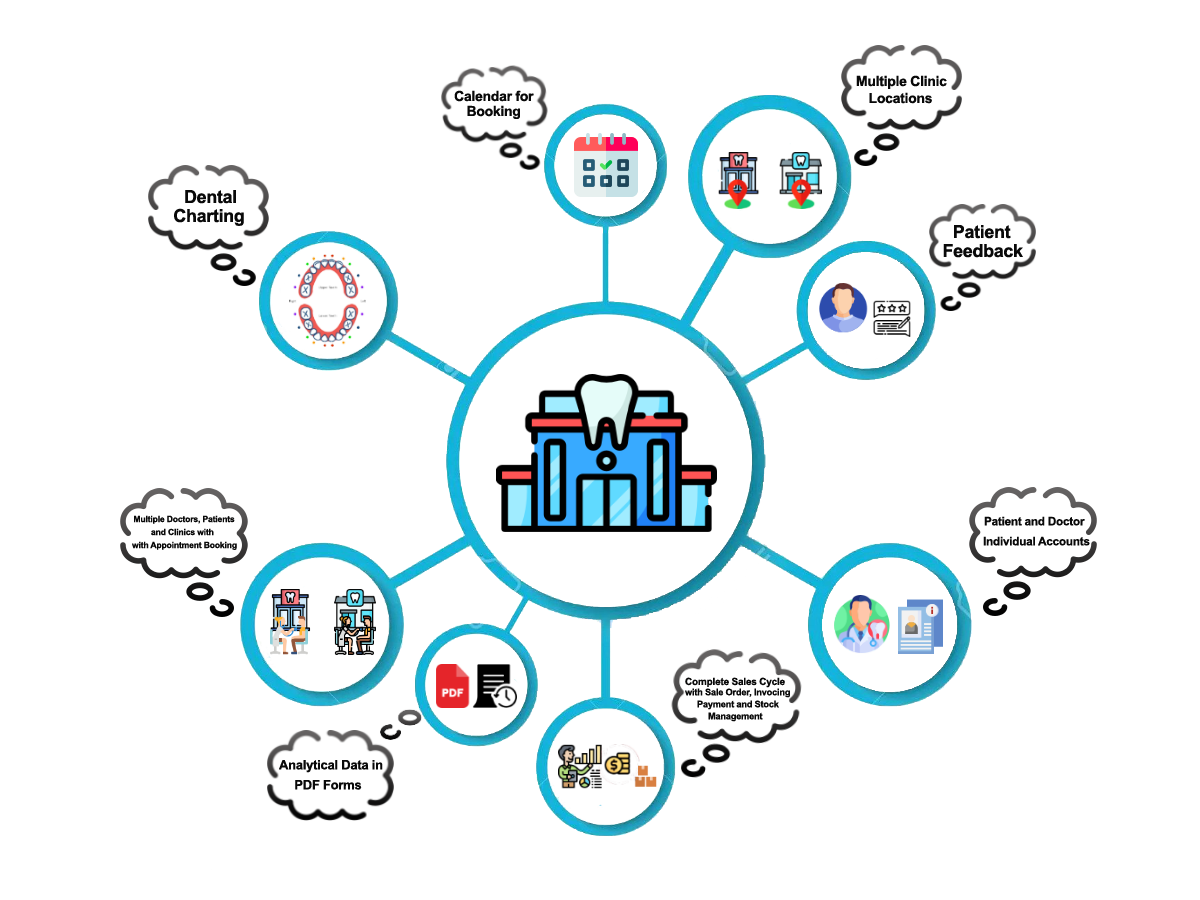Dental Clinic Management System

Dental clinics, in particular, require streamlined processes to handle appointments, patient records, billing, and other administrative tasks efficiently. To address these needs, dental clinic management systems have emerged as invaluable tools, offering a comprehensive solution to enhance both operational efficiency and patient care.
A dental clinic management system is a software application specifically designed to automate and streamline various administrative and clinical tasks within a dental practice. These systems typically include modules for appointment scheduling, patient management, electronic health records (EHR), billing and invoicing, inventory management, and reporting. By integrating these functions into a single platform, dental clinic management systems simplify workflows, reduce paperwork, minimize errors, and improve overall productivity.
One of the primary features of a dental clinic management system is appointment scheduling. With the ability to view the availability of dentists and book appointments in real-time, both patients and clinic staff can save time and avoid scheduling conflicts. Automated appointment reminders via email or SMS help reduce no-shows, ensuring that the clinic operates efficiently and revenue is maximized. Additionally, some systems offer online appointment booking capabilities, allowing patients to schedule visits conveniently through the clinic's website or mobile app.
Patient management is another essential aspect of dental clinic operations that can greatly benefit from a management system. These systems maintain comprehensive patient records, including personal information, medical history, treatment plans, and notes from previous visits. Having easy access to this information enables dentists to deliver personalized care and make informed decisions about treatment options. Furthermore, integration with digital imaging systems allows for the storage and retrieval of X-rays and other diagnostic images directly within the patient's electronic file.
Electronic health records (EHR) functionality is central to modern dental clinic management systems. By digitizing patient records, clinics can eliminate the need for paper charts, reducing clutter and the risk of misplaced or lost documents. EHR systems also facilitate communication and collaboration among healthcare providers by enabling secure sharing of patient information. Additionally, they support compliance with regulatory requirements such as HIPAA (Health Insurance Portability and Accountability Act) by ensuring the confidentiality and security of patient data.
Billing and invoicing capabilities streamline the financial aspects of running a dental practice. With integrated billing functionality, clinics can generate invoices, process payments, and manage insurance claims efficiently. Automated billing processes help minimize errors and accelerate revenue cycle management, improving cash flow and financial transparency. Moreover, detailed reporting features provide insights into clinic performance, revenue trends, and outstanding balances, enabling informed decision-making and strategic planning.
Inventory management is another critical function supported by dental clinic management systems. By tracking supplies, materials, and equipment usage in real-time, clinics can ensure adequate stock levels and prevent shortages or overstocking. Automated alerts notify staff when inventory items need to be reordered, reducing the risk of disruptions to patient care. Additionally, integration with suppliers and vendors streamlines the procurement process, saving time and reducing administrative overhead.
A dental clinic management system is a software application specifically designed to automate and streamline various administrative and clinical tasks within a dental practice. These systems typically include modules for appointment scheduling, patient management, electronic health records (EHR), billing and invoicing, inventory management, and reporting. By integrating these functions into a single platform, dental clinic management systems simplify workflows, reduce paperwork, minimize errors, and improve overall productivity.
One of the primary features of a dental clinic management system is appointment scheduling. With the ability to view the availability of dentists and book appointments in real-time, both patients and clinic staff can save time and avoid scheduling conflicts. Automated appointment reminders via email or SMS help reduce no-shows, ensuring that the clinic operates efficiently and revenue is maximized. Additionally, some systems offer online appointment booking capabilities, allowing patients to schedule visits conveniently through the clinic's website or mobile app.
Patient management is another essential aspect of dental clinic operations that can greatly benefit from a management system. These systems maintain comprehensive patient records, including personal information, medical history, treatment plans, and notes from previous visits. Having easy access to this information enables dentists to deliver personalized care and make informed decisions about treatment options. Furthermore, integration with digital imaging systems allows for the storage and retrieval of X-rays and other diagnostic images directly within the patient's electronic file.
Electronic health records (EHR) functionality is central to modern dental clinic management systems. By digitizing patient records, clinics can eliminate the need for paper charts, reducing clutter and the risk of misplaced or lost documents. EHR systems also facilitate communication and collaboration among healthcare providers by enabling secure sharing of patient information. Additionally, they support compliance with regulatory requirements such as HIPAA (Health Insurance Portability and Accountability Act) by ensuring the confidentiality and security of patient data.
Billing and invoicing capabilities streamline the financial aspects of running a dental practice. With integrated billing functionality, clinics can generate invoices, process payments, and manage insurance claims efficiently. Automated billing processes help minimize errors and accelerate revenue cycle management, improving cash flow and financial transparency. Moreover, detailed reporting features provide insights into clinic performance, revenue trends, and outstanding balances, enabling informed decision-making and strategic planning.
Inventory management is another critical function supported by dental clinic management systems. By tracking supplies, materials, and equipment usage in real-time, clinics can ensure adequate stock levels and prevent shortages or overstocking. Automated alerts notify staff when inventory items need to be reordered, reducing the risk of disruptions to patient care. Additionally, integration with suppliers and vendors streamlines the procurement process, saving time and reducing administrative overhead.





















